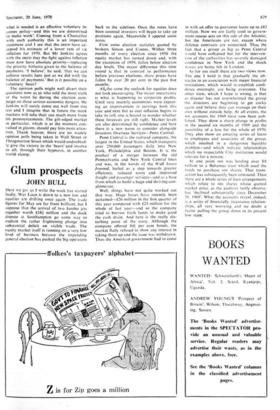Glum prospects
JOHN BULL
Here we go: as I write the week has started badly. War Loan is down to a new low and equities are drifting once again. The trade figures for May are far from brilliant, but I suppose that the arrival of two Jumbo jets together worth £18+ million and the dock dispute at Southampton go some way to explain the rather frightening plunge into substantial deficit on visible trade. The equity market itself is running On a very low level of business because the impending general election has pushed the big operators back to the sidelines. Once the votes have been counted investors will begin to take up positions again. Meanwhile I append some notes.
First some election statistics quoted by brokers Simon and Coates. Within three months of every election since 1950 the equity market has turned down and, with the exception of 1959, fallen below election day levels. The major difference this time round is that in contrast to performance before previous elections, share prices have fallen by over 20 per cent in the past five months.
All,the same the outlook for equities does not look encouraging. The major uncertainty is what is happening to corporate profits. Until very recently economists were expect- ing an improvement in earnings both this year and next but as cost inflation begins to take its toll, one is bound to wonder whether these forecasts are still right. Market levels are also determined by confidence and here there is a new name to consider alongside Investors Overseas Services—Penn Central.
Penn Central is the railroad company, the largest in the United States, which transports over 250,000 passengers daily into New York, Philadelphia and Boston. It is the product of a merger between the old Pennsylvania and New York Central lines and was, in the words of the Wall Street Journal, hailed as a step towards greater efficiency, reduced costs and improved freight and passenger services—and as a base from which to build a huge and thriving con- glomerate.
Well, things have not quite worked out that way. Huge losses have recently been sustained—f26 million in the first quarter of this year compared with £23 million for the whole of last year—and so the company tried to borrow fresh funds to make good the cash drain. And here is the really dis- turbing point of the story. Although the company offered 10+ per cent bonds, the market flatly refused to show any interest in taking them up and the issue was withdrawn. Thus the American government had to come
ffolkes's taxpayers' alphabet
Z is for Zip goes a million
in with an offer to guarantee loans up to f83 million. Now we are fairly used to govern- ment rescue acts on this side of the Atlantic; but the Americans are not, except where defence contracts are concerned. Thus the fact that a group as big as Penn Central would have collapsed but for the interven- tion of the authorities has severely damaged confidence in New York and the shock waves are being felt in London.
As for los itself there are two views now. The one I hold is that gradually the ob- stacles to an association with major financial institutions, which would re-establish confi- dence overnight, are being overcome. The other view, which I hope is wrong, is that as disaster has not overwhelmed the group the directors are beginning to get cocky again and believe they can manage on their own without outside help. At all events, the tos accounts for 1969 have now been pub- lished. They show a sharp plunge in profits in the second six months of 1969 and the possibility of a loss for the whole of 1970. They also show an amazing series of loans to employees and associates of the group, which resulted in a dangerous liquidity problem—and which indicate relationships which no respectable City institution would tolerate for a minute.
At one point los was lending over $8 million to a Bahamas trust which used the funds to purchase tos shares. That trans- action has subsequently been unwound. Then there are a whole series of loan arrangements which relate to tos shares whose quoted market price, as the auditors tartly observe, has 'declined substantially since December 31, 1969'. What the accounts reveal, indeed, is a series of financially incestuous relation- ships, all very worrying and no doubt a factor pulling the group down to its present low state.


































 Previous page
Previous page